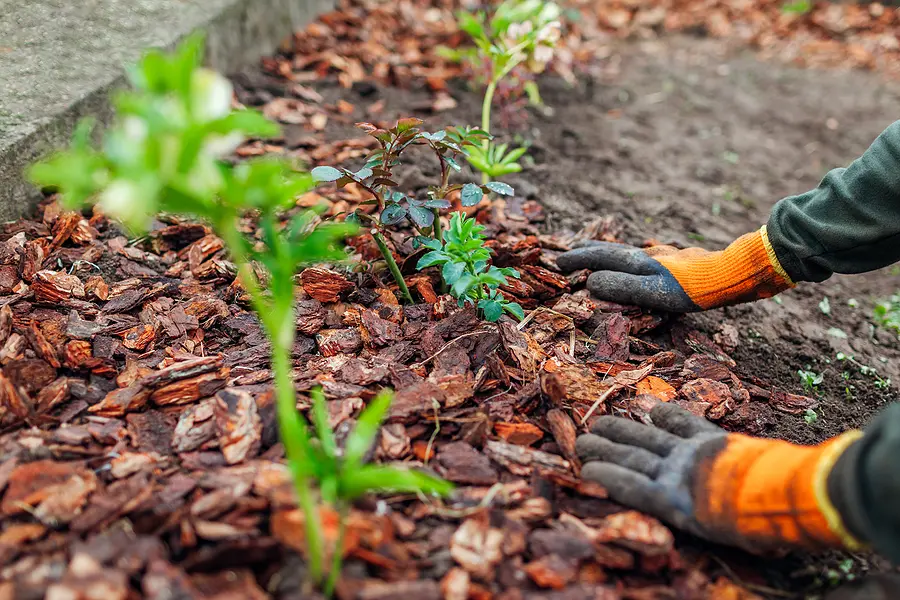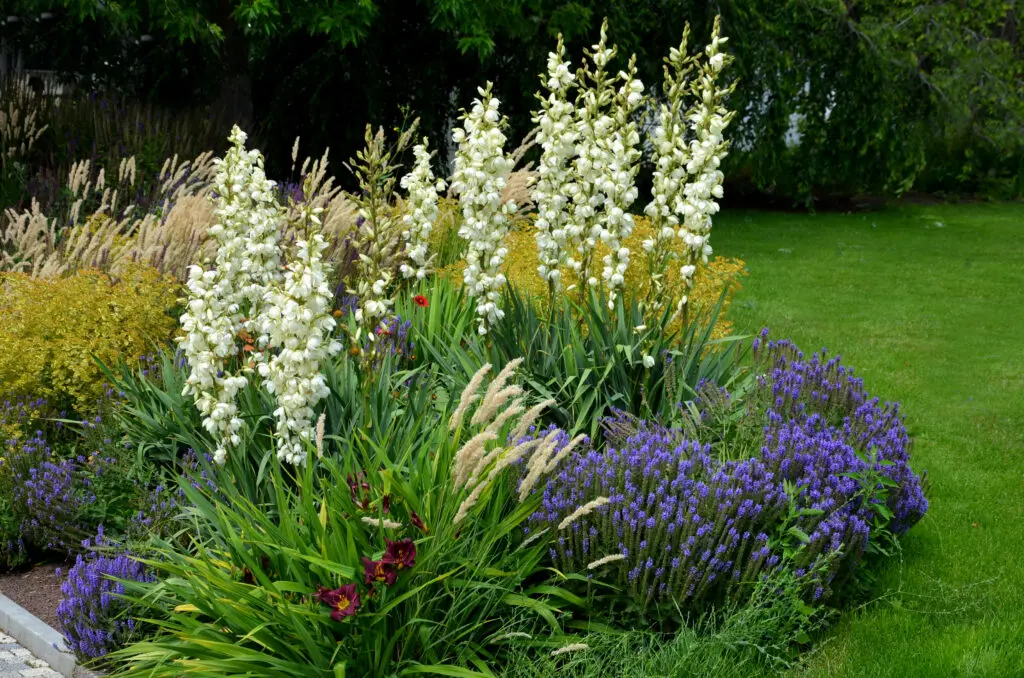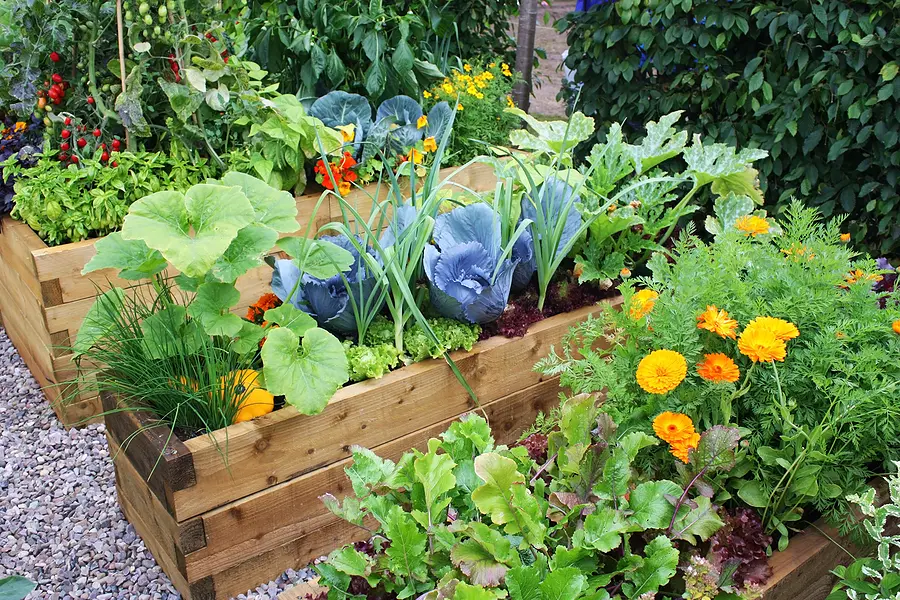Is Mulching Really That Important for My Summer Garden?

Our gardens and lawns take a beating during the summer. In our extreme heat and extreme dry spells, plants may become stressed and exhibit wilted leaves and poor growth.
The good news is, mulching is a great way to combat these problems. Mulching adds not just a beautifying touch to your garden, but also an essential component to help keep your soil healthy, produced and plants vigorous.
How? By applying mulch, we allow our gardens to keep in moisture, and this is particularly key on those hot summer days when the evaporation rates are off the charts.
By retaining moisture, the water in the soil will last longer, and this provides a constant water supply for our plants. In addition, mulch is an insulator and helps to maintain soil temperature. This will allow the soil to remain cool and less stressed making you plant healthy.
Mulching also helps prevent weed growth, because it blocks access of light to the topsoil and the surface, and so it becomes more difficult for weed seeds to really germinate. Struggling less with weeds for nutrients and water, our plants can prosper.
Benefits of Mulching in Summer
Moisture Retention
Mulching works wonders at helping to keep soil moist over the summer months. We all know how critical watering is for healthy plants, and mulch acts as a “blanket” over the soil, reducing water evaporation. With the addition of a mulch layer, we trap that moisture in the soil to be utilized by the plants for much longer.
Plants do a better job of absorbing water when it’s been in the soil for a little while. This steadiness allows the plants to flourish even during the hottest months.
Instead of frequently watering plants, which is both time consuming and quickly drains essential moisture in the baking heat of summer, mulch helps it to last. This saves water and reduces plant stress resulting in healthier plants.
Temperature Regulation
One of the advantages of mulching is temperature regulation of soil. Open ground can become scorching hot in the sun, harming the roots of plants. The mulch also serves as an insulating layer, cooling the soil on hot days. This cooler temperature controls root stress for proper plant development.
On cooler nights, mulch also holds in a little heat, so the soil is less likely to experience a sudden temperature drop. The flat and uniform soil temperature is essential for the health of the roots and it’s a mulch that provided me this stability. With roots not at all stressed by Buxus roots, plants put all their energy into developing healthy and strong plants.
Types of Mulch and Their Advantages
Organic Mulch Options
Organic mulches are composed of natural substances such as wood shavings, straw, leaves and grass clippings. These mulches break down, enhancing the soil with nutrients. The use of organic mulch can help build up the soil structure and nutrient content, providing better growing conditions for plants.
Flower beds and tree areas are nice locations for wood chips. Straw is good in vegetable beds, grass clippings are good elsewhere. You also can use compost, since it not only adds nutrients but also acts as a mulch. The decomposition of organic mulch increases the activity of soil microorganisms and, as a result, is advantageous for the health of plants.
Inorganic Mulch Options
Inorganic mulches are items such as gravel, stones and landscape fabric. These do not break down and have no nutrients in them. That being said, they are perfect for long-term use and maintenance is minimal than organic mulch.
Pebbles are ideal for pathways, driveways, and garden or border decor. They hold moisture in the soil and help keep it warm besides being pretty to look at. Landscaping fabric, sometimes laid over stone or gravel, serve to further reduce the spread of weed. Plastic mulch is another form of mulch and is used with the goal of suppressing weeds and conserving water in crop production.
There are many different types of mulch and each has its own advantages, so it usually depends on what your garden needs. From organic to inorganic options, mulching contributes to a healthier garden during the summer heat.
Best Practices for Applying Mulch
Proper Application Techniques
If we want to make the most of mulching, we need to know how to apply it. Begin by removing any weeds or debris from the space where you want to lay the mulch.
This gives me a “clean” surface and works to pull weeds for me. Then, apply a thick, even layer of mulch around the plants (it should be 2 to 4 inches deep). Be sure to leave the base of each plant a little room to avoid rot and allow air circulation.
Use a wheelbarrow to help spread the mulch evenly for larger areas. Spread the mulch with a garden rake and make it level. With too thin an application you won’t achieve any benefits, but also with too thick, your plant roots will be stifled. Consistency of mulch thickness is key to maintaining even moisture and temperature levels throughout your garden.
Common Mistakes to Avoid
There are a few mistakes that gardeners frequently make when mulching, which we can avoid. One of the common mistakes is mounding mulch too high, forming the so-called “mulch volcanoes” around trees. This can rot the bark and prevent water intake. Instead make a shallower, wider mulch ring.
A second error is using compost that is tainted with weed seeds or pests. Purchase only quality materials when it comes to different products. Finally, don’t mulch too late in the season, as it won’t be as useful. The sooner you apply (ideally late spring into early summer), the longer the benefits are available during the hottest part of the year.
Long-Term Mulching Strategies
Mulching that works is not just a once-and-for-all process, it needs regular seasonal upkeep. We need to inspect the mulch regularly, particularly after significant rainfall, to see if it needs renewal.
Organic mulches break down over time and need to be replenished yearly. We also should fluff the old mulch up from time to time with a rake to increase air movement and prevent it from becoming matted.
If it’s been bad where you live and leaves are all over, you may need to rake some of them off from the mulch to avoid the growth of nasty mold or any fungi. During cooler months, you can protect the soil and the roots of plants from very low temperatures by adding a thicker layer of mulch. These seasonal maintenance tasks help ensure your garden stays in its best condition all year long.
Mulching Your Way to Better Lawn Care
Incorporating mulch in our regular lawn care program is the way to go when we want to benefit from it in the long term. Mulching should be considered as part of our annual garden clean up and preparation. Mulching combined with other lawn care methods, including fertilising and watering offers a full system to ensure a healthy garden.
And it’s equally helpful to inform family members, or anyone pitching in with yard work, on how to mulch correctly. Uniform processes throughout the garden do both the plants and the plantsman good. When you make mulching a habit, the landscape will stay glorious and strong all year.
Final Thoughts
Mulching is an essential discipline that has a great impact on our gardens, particularly during the hot summer months. Mulching can make a real difference in helping plants to succeed, especially when conditions are tough.
Knowing the differences between the types of mulch and their benefits enables us to make an informed decision and select the best choice for our situation. By learning the best way to apply and preventing mistakes, we are able to spread our mulching time more efficiently.
Long-term strategies like seasonal maintenance and incorporating mulch into our regular lawn care routine will bring long-term results. Good mulch increases and sustains soil quality, eliminates the need for chemical treatments, and encourages better plants that are more resistant to pests and disease.
Eager to improve your garden with all the advantages of mulching? Call ASAP Sands Outdoor Services now for local lawn care services and professional lawn care in Albuquerque. Hire us as we make a lush, vibrant garden for you that can survive the summer heat.

